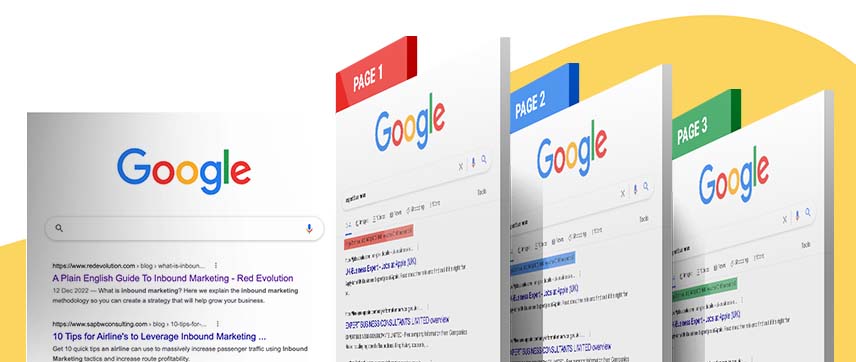The concept of SEO, which stands for Search Engine Optimisation, is, to some people, confusing. This means when it comes to figuring out how to find a good SEO expert, things can get messy. People often fear having the wool pulled over their eyes or being exploited, and we're on a mission to outlaw that.
In this article, we'll explain SEO at a high level using plain English and provide some solid advice you can use about how to find a good SEO expert. Sound like a plan? Great. Let's get going.
Let's Start With What Is SEO
SEO is a set of techniques and practices aimed at improving the visibility of a website or web page in a search engine's unpaid results, often referred to as "natural," "organic," or "earned" results. The ultimate goal is to increase website traffic through higher search engine rankings and generate leads or enquiries from there.
Of course, search engine results pages or SERPs these days are very noisy. A noisy Search Engine Results Page (SERP) is a results page containing many things other than the traditional organic search results. This might include advertisements, featured snippets or soundbites, image carousels, videos, news boxes, maps, etc.
While these additional elements can sometimes be helpful to users by providing quick answers, they can also be seen as "noise" from the perspective of websites trying to gain traffic through organic search results. The presence of these elements can push organic results further down the page, making it harder for them to be seen by users and thus affecting click-through rates.
In some cases, particularly in competitive niches or for highly commercial queries, the first viewable area of a SERP may be almost entirely occupied by ads, with organic results not visible until the user scrolls down. For website owners and SEO professionals, a noisy SERP can be challenging, as it requires adapting SEO strategies to compete with other organic listings and the various additional elements that search engines display.
We've seen clients secure fantastic search rankings but get very few visits or enquiries because of a noisy SERP. Sounds painful, right.
SEO Explained In Simple Language
But setting that aside for now, SEO is still very much a worthwhile exercise, but it has many component parts, which we'll explain here:
1. Keyword Research:
Identifying and incorporating the terms and phrases people use to search for information on search engines. These keywords should be relevant to the website's content and integrated naturally.
Imagine you have a website where you sell handmade candles. You want people to find your website when they use Google or another search engine to look for candles to buy. Keyword research is like figuring out what words or phrases people might type into the search engine when looking for candles.
So, you're playing detective. You're trying to think like the people who might want to buy your candles. What would they type into the search engine? They might type in "handmade candles," "scented candles," or "decorative candles."
Now, you don't just want to guess - you want to know which words or phrases are popular. Some tools can tell how many people search for specific words or phrases. They can even suggest other words or phrases you might not have thought of.
Once you know which popular words or phrases, you can use them on your website. You might include them in the titles of your pages, in the descriptions of your candles, or in articles you write about how your candles are made.
This way, when people type those words or phrases into a search engine, there's a better chance that they will find your website. Keyword research is about understanding what people are looking for and ensuring your website uses those words.

2. On-Page SEO:
On-page involves optimising various elements on a webpage, such as title tags, headings, images, and the content itself, to make it more attractive to search engines.
On-page SEO is like ensuring your shop is neat, organised, and easy to find, but in the online world. Imagine your website is a shop, and Google is like an enormous shopping arcade. On-page SEO is about organising your shop so the arcade knows what you sell and customers find it appealing.
Here are a few ways you can do this:
a. Readable and Interesting content: Think of your website's content as the products in your shop. You want to ensure they are quality, engaging, and something people want. Ensure your site's writing is easy to read and provides valuable information. Just like this blog post.
b. Descriptive Titles and Headings: These are like the signs in a shop. A sign that says "Handmade Candles" is helpful for someone looking for candles. On your website, you want to use titles and headings that clearly tell people what the page is about.
c. Fast Loading Time: Imagine walking into a shop and waiting a long time for someone to help you. You might leave. It's the same with your website. If it takes too long to load, people might go. So, you want to make sure it's fast.
d. Easy to Navigate: Consider how annoying it is when you can't find what you're looking for. Your website should be organised so people can easily find what they need.
e. Mobile Friendly: Many people browse the web on their phones. If your website is like a shop that's easy to walk around on a computer but really hard to get through on the phone, you'll lose those phone customers. Make sure your website is easy to use on phones. In fact, today, most websites are designed for phones first and laptops second. It's called mobile-first design.
f. Use Images Wisely: Imagine a shop with pictures of products but no information. If you use pictures on your website, add a short description to tell people about the image.
g. Being Honest and Trustworthy: People like buying from trustworthy shops. Make sure your website looks professional and reliable. Include information about yourself and your business but don't make exaggerated claims.
Doing all these things makes your website a nice place to visit. This makes it more likely that the shopping arcade (Google) will recommend your store to shoppers (web users) and that they'll like what they see when they get there. That's what on-page SEO is all about.

3. Off-Page SEO:
Off-page involves actions taken outside your website that can impact your rankings within search engine results pages (SERPs). The most common method is link building, which is getting other websites to link back to your site.
This aspect of SEO often causes great confusion, but the idea is simple.
Imagine your website is a shop in a town, and all the other websites are also different shops and places in that town. Now, think of links as roads that connect all these shops and businesses. The more streets that lead to your shop, the more accessible for people to find and visit it.
In the online world, link building is like creating more roads to your shop (website). It means getting other websites to link your website from theirs. When someone is on another website and sees a link to your website, they can click it and visit it.
Google and other search engines act like town guides. They suggest the best shops (websites) to the people (internet users). If a lot of roads (links) from lovely places (reputable websites) lead to your shop (website), the town guides (search engines) think your shop must be pretty good, so they are more likely to suggest it to people.
But it's not just about having a lot of roads leading to your shop; it's about who those roads are from. If well-respected and famous places in town have roads (links) to your shop, that's even better.
So, link building is like making friends with other shop owners and places in town and asking them if they can build roads (put links) to your shop (website). It helps more people find your shop and makes the town guides (search engines) think highly of it.

4. Technical SEO:
Optimising your website's backend structure and foundation. This includes aspects like site speed, mobile optimisation, site structure, security, structured data, and sitemaps. A good SEO site audit will give you the answers you need.
If link building is confusing to many people, technical SEO is poison. But here's a quick jargon-free overview.
Let's imagine your website as a house and technical SEO as ensuring the home is sturdy and easy for visitors and the postman (Google) to find and explore.
a. Swift Door Opening: If your front door takes ages to open when someone knocks, they might wander off. Similarly, if your website takes too long to load, people might not stick around. Technical SEO involves making sure your website's "door" opens promptly.
b. Maps for the Postman: A postman must know where to deliver letters. Similarly, search engines like Google need a map of your website to understand what's inside. Technical SEO ensures your website has a clear map (called a "sitemap") that helps Google know what pages you have.
c. Mobile Friendly: Imagine people visiting your home. Some might come in cars, others on bicycles. If your garage only fits cars, cyclists can't park. Being mobile-friendly means ensuring your website is easy to use on computers, mobiles, and tablets. We also mentioned this above.
d. Secure Locks on Doors: You wouldn't want anyone to break into your home, would you? Websites also need protection. Technical SEO ensures your website is secure, so visitors' information is safe, like having a sturdy lock on your front door.
e. Making Your Home Easy to Find: Just like having a precise address makes it easier for friends to find your home, having a clean and straightforward web address (URL) makes it easier for people to find your web pages. It's like having your house number clearly visible from the street.
f. No Jammed Doors or Windows: If someone tries to open a door in your home and it's jammed, it's frustrating. Sometimes, links on websites don't work, and when people click on them, they see an error. Technical SEO is like oiling jammed doors and windows, ensuring all links work.
g. Making Home Accessible for All: Just like public buildings should have ramps for wheelchairs, your website should be accessible to everyone, including people with disabilities. Technical SEO ensures people with different needs can easily use the website.
In summary, technical SEO ensures your home is well-built, secure, quick to enter, and easy for visitors and the postman to navigate. It's about providing nothing is jammed, and everyone can find and appreciate what's inside. It's the equivalent of keeping your home in tip-top shape.
5. Content Marketing:
Creating high-quality content in a strategic way provides value to users. This can include blog posts, videos, infographics, and more. Content that answers users' queries will likely rank higher in search engines.
To explain, imagine content marketing as hosting a party in your garden.
a. Inviting the Right Guests: First, you would think about who would enjoy your tea party so you could make sure you created something they would enjoy. Content marketing is similar – you must produce articles, videos, or social media posts that interest the people you want to reach.
b. Serving Tasty Treats: At your tea party, you want to serve delicious cakes, scones, and sandwiches. In content marketing, this means creating content that's like a tasty treat – it should be engaging, useful, or entertaining so that people want to consume it.
c. Regular Tea Parties: If you host just one tea party, people might forget about it. But if you have them regularly, people will start remembering and looking forward to them. Similarly, in content marketing, you should create new content regularly so people return for more.
d. Spreading the Word: You would tell your friends and neighbours about your tea party, right? In content marketing, you need to share your content – like letting people know when you've written a new article or made a new video. You can do this by posting on social media or sending out newsletters.
e. Listening to Your Guests: At your tea party, if your guests say they loved the scones but weren't keen on the sandwiches, next time, you might make more scones. In content marketing, you must pay attention to what people like and don't select and create more of what they enjoy.
e. Becoming the Talk of the Town: If your tea parties are fantastic, people will start talking about them and bringing their friends. Similarly, if your content is excellent, people will share it with others. Eventually, you might become well-known for your content, just like you might become famous in your neighbourhood for your tea parties.
This is also a great way to get links, which, as you now know, helps a lot with search rankings.
f. From Tea Parties to Business: Now imagine that you own a shop selling tea and cakes. Your tea parties have made you popular, and people now know your offerings are delicious. Some of your guests might visit your shop to buy tea or cakes. Similarly, content marketing can eventually lead people to believe in your products or services.

So, content marketing is like hosting fabulous tea parties that get people talking about you and what you offer. Through engaging and valuable content, you build relationships with your audience. Over time, they become interested in what you're selling.
6. User Experience (UX):
Google and other search engines place a premium on the user experience. A website with a good user experience will likely rank higher in search results. This includes factors like page load speed, mobile-friendliness, and easy navigation.
It's an area of SEO that requires expertise. Even if you find a good SEO expert, they may be unable to tick this box, so it's worth asking the question from the outset. A real expert will acknowledge their limitations and have a partner they work with for the areas they don't cover themselves.

7. Tracking and Analytics:
Using tools like Google Analytics to monitor traffic, engagement, and conversions. It's essential for measuring the effectiveness of your SEO efforts and making data-driven decisions.
To explain this aspect of SEO, we can use the following analogy. Imagine you've opened a lemonade stand on your street.
a. Counting Customers: You want to know how many people visit your lemonade stand daily. In the online world, tracking and analytics help you see how many people visit your website.
b. Asking for Feedback: You might ask your customers what they think of your lemonade or if they have any suggestions. Online analytics can show you what people are clicking on, what pages they spend time on, and if they leave feedback or comments.
c. Noting Where Customers Come From: You'd be curious to know if your customers live on your street, come from the next road, or even from another part of town. Similarly, analytics tell you where your online visitors are coming from – whether from search engines, social media, or other websites.
d. Checking the Time: You want to know what time of day most people come to buy lemonade, so you can make sure you're ready for them. Online analytics tell you when people visit your website, so you can post new content or run promotions at the best times.
e. What Attracts Them: Maybe you put up a colourful poster and notice more people coming after that. This is like seeing which keywords or phrases people use in search engines to find your website. It helps you understand what draws them in.
f. Returning Customers: If someone comes back to your lemonade stand every day, that's a good sign they like your lemonade. Online analytics can tell if people visit your website once or return repeatedly.
g. Making Changes Based on What You Learn: If you realise people love strawberry lemonade the most, you might decide to make more of that flavour. In the same way, by using the information from tracking and analytics, you can make changes to your website to make it more appealing to visitors.

In summary, tracking and analytics in SEO are like keeping an eye on your lemonade stand and taking notes about your customers. This helps you understand what they like when they come and where they're coming from. With this knowledge, you can change your lemonade stand (or website) to attract even more happy customers.
8. E-E-A-T (Experience, Expertise, Authoritativeness, and Trustworthiness):
Google has emphasised high-quality content more, particularly in YMYL (Your Money or Your Life) niches. Websites that demonstrate expertise, authority, and trustworthiness in their area of expertise are more likely to rank highly. Here's a little more detail.
a. Experience: Is the author quantifiably experienced. For example, do they have recognised qualifications and peer-group respect? Realistically this may be hard to verify.
b. Expertise: Refers to the level of knowledge or skill in a particular area. Content creators with proper credentials or experience in their field are more likely to produce content that reflects expertise.
c. Authoritativeness: This is about the credibility of the website publishing the content. This can be measured through things like the quality of the content, external links, and the author's credentials.
d. Trustworthiness: Encompasses the reliability and legitimacy of the website and its content. Secure sites and those with clear contact information and positive user engagement are more trustworthy.

E-E-A-T is not a score but a concept that Google uses as part of its Search Quality Rater Guidelines. These guidelines are used by human evaluators to assess the quality of search results. Google uses the feedback from these evaluators to improve its search algorithms.
So How Do You Actually Find An SEO Expert?
So now you understand the concepts of SEO, we can move on to how to find a good SEO expert, finally!
We think Google's expert, Maile Ohye, pretty much nails this question in this superb, short video.
In the video, Maile boils things down to figuring out if the person sounds credible or is making wild claims about being able to perform miracles.
To use a similar analogy to the ones we've used above, finding a good SEO expert is like finding someone who can make your store popular in a busy market. Imagine your website is a store, and SEO is a way to ensure people can easily find it and like what they see. Here's how you find someone suitable to help you:
a. Ask Friends: Talk to your friends with stores (websites) too. Ask them if they know someone who helped make their store popular. Sometimes friends know the best people.
b. Read Reviews: Look for SEO experts on the internet and read what others say about them. It's like checking if people say good things about a builder before letting them fix your house.
c. Look for Experience: Find out if the SEO expert has made other stores (websites) popular. If they have, they might be able to help you.
d. Chat with Them: Talk to a few SEO experts. It's like interviewing a babysitter for your kid. You want to see if you like them and trust them with something meaningful.
e. Know What To Pay: Some people might ask for a small fee but won't do much. Others might ask for a lot of money but will do a great job and be able clearly show you where your budget is being spent. Make sure you understand what's being done.
When we work with our clients, we insist on weekly meetings to discuss what we're doing and why. If you find a good SEO expert, make sure they do the same.
f. Don't Trust Magic: Be careful if someone says they can make your store the most popular overnight. Just like in real life, becoming popular takes time and effort. There's no magic. THERE IS NO MAGIC.
g. Keep an Eye On Things: After you choose an SEO expert, watch your store (website) closely. Make sure more people are finding it and liking what they see. If not, you'll be back to square one, wondering how to find a good SEO expert.

Finding a good SEO expert takes time and requires patience. Find an SEO agency where the chemistry and track record is good, and you'll be well on your way to SEO success.

